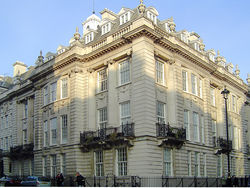London CPS Workshop: Difference between revisions
No edit summary |
No edit summary |
||
| Line 19: | Line 19: | ||
Recent technological developments in sensing, communications, control and computation have created an emerging class of complex systems, called Cyber-Physical Systems. Cyber-Physical Systems are characterized by large numbers of tightly integrated heterogeneous components in a network, which may expand and contract dynamically. Cyber-Physical Systems are very common and are becoming increasingly ubiquitous. The control of such systems presents huge challenges and requires designs drawn from approaches such as those in traditional control, hybrid control systems, discrete event systems, and networked control. In addition, robustness, reliability and security issues for reconfiguring dynamical systems must also be addressed. This integration of different technologies and scientific domains presents new and challenging fundamental problems underlying the theoretical foundations for this class of systems. | Recent technological developments in sensing, communications, control and computation have created an emerging class of complex systems, called Cyber-Physical Systems. Cyber-Physical Systems are characterized by large numbers of tightly integrated heterogeneous components in a network, which may expand and contract dynamically. Cyber-Physical Systems are very common and are becoming increasingly ubiquitous. The control of such systems presents huge challenges and requires designs drawn from approaches such as those in traditional control, hybrid control systems, discrete event systems, and networked control. In addition, robustness, reliability and security issues for reconfiguring dynamical systems must also be addressed. This integration of different technologies and scientific domains presents new and challenging fundamental problems underlying the theoretical foundations for this class of systems. | ||
==Organizers== | |||
==Preliminary Participant List== | |||
The workshop is by invitation only. Please contact the organizers if you have an interest in participating but have not been invited. | |||
As of May 15, 2012, the following is a tentative list of participants. Abstracts or short papers will be linked here as they are received from the speaker. | |||
===Germany=== | |||
* Frank Allgower <!-- <frank.allgower@ist.uni-stuttgart.de> --> | |||
* Stefan Kowalewski <!-- <kowalewski@embedded.rwth-aachen.de> --> | |||
* Joerg Raisch <!-- <raisch@control.tu-berlin.de> --> | |||
* Sandra Hirche <!-- <hirche@tum.de> --> | |||
* MAYBE Sebastian Engell <!-- <sebastian.engell@chemietechnik.Uni-Dortmund.DE> --> | |||
===Greece=== | |||
* Kostas Kyriakopoulos <!-- kkyria@central.ntua.gr --> | |||
===Italy=== | |||
* Marika Di Benedetto <!-- <mariadomenica.dibenedetto@univaq.it> --> | |||
* Antonio Bicci <!-- <bicchi@centropiaggio.unipi.it> --> | |||
===France=== | |||
* Carlos Canudas-de-Wit <!-- carlos.canudas-de-wit@gipsa-lab.inpg.fr --> | |||
===Netherlands=== | |||
* Maurice Heemels <!-- <W.P.M.H.Heemels@tue.nl> --> | |||
* Arjan van der Schaft <!-- a.j.van.der.schaft@math.rug.nl --> | |||
* Claudio De Persis <!-- c.de.persis@rug.nl --> | |||
===Norway=== | |||
* Tor Arne Johansen <!-- <Tor.Arne.Johansen@itk.ntnu.no> --> | |||
===Portugal=== | |||
* João Sousa <!-- <jtasso@fe.up.pt> --> | |||
===Spain=== | |||
* Eduardo F. Camacho <!-- <eduardo@esi.us.es> --> | |||
===Sweden=== | |||
* Karl-Erik Årzén <!-- <karlerik@control.lth.se> --> | |||
===UK=== | |||
* Alessandro Astolfi <!-- <a.astolfi@imperial.ac.uk> --> | |||
* Thomas Parisini <!-- <parisini@univ.trieste.it> --> | |||
* Richard Vinter <!-- <r.vinter@imperial.ac.uk> --> | |||
* Malcolm Smith <!-- <mcs@eng.cam.ac.uk> --> | |||
* Jan Maciejowski <!-- < jmm@eng.cam.ac.uk> --> | |||
===USA=== | |||
* Janos Sztipanovits <!-- <janos.sztipanovits@vanderbilt.edu> --> | |||
* Xenofon Koutsoukos <!-- <Xenofon.Koutsoukos@vanderbilt.edu> --> | |||
* John S. Baras <!-- <baras@umd.edu> --> | |||
* MAYBE George Pappas <!-- <pappasg@seas.upenn.edu> --> | |||
* MAYBE Paulo Tabuada <!-- <tabuada@ee.ucla.edu> --> | |||
==Acknowledgements== | |||
The organizers would like to acknowledge the support of the National Science Foundation, the University of Notre Dame, the College of Engineering at the University of Notre Dame and the Department of Electrical Engineering at the University of Notre Dame. | |||
Revision as of 19:00, 15 May 2012
 |
Workshop on Cyber-Physical Systems |
 |
Workshop Scope and Purpose
Recent technological developments in sensing, communications, control and computation have created an emerging class of complex systems, called Cyber-Physical Systems. Cyber-Physical Systems are characterized by large numbers of tightly integrated heterogeneous components in a network, which may expand and contract dynamically. Cyber-Physical Systems are very common and are becoming increasingly ubiquitous. The control of such systems presents huge challenges and requires designs drawn from approaches such as those in traditional control, hybrid control systems, discrete event systems, and networked control. In addition, robustness, reliability and security issues for reconfiguring dynamical systems must also be addressed. This integration of different technologies and scientific domains presents new and challenging fundamental problems underlying the theoretical foundations for this class of systems.
Organizers
Preliminary Participant List
The workshop is by invitation only. Please contact the organizers if you have an interest in participating but have not been invited.
As of May 15, 2012, the following is a tentative list of participants. Abstracts or short papers will be linked here as they are received from the speaker.
Germany
- Frank Allgower
- Stefan Kowalewski
- Joerg Raisch
- Sandra Hirche
- MAYBE Sebastian Engell
Greece
- Kostas Kyriakopoulos
Italy
- Marika Di Benedetto
- Antonio Bicci
France
- Carlos Canudas-de-Wit
Netherlands
- Maurice Heemels
- Arjan van der Schaft
- Claudio De Persis
Norway
- Tor Arne Johansen
Portugal
- João Sousa
Spain
- Eduardo F. Camacho
Sweden
- Karl-Erik Årzén
UK
- Alessandro Astolfi
- Thomas Parisini
- Richard Vinter
- Malcolm Smith
- Jan Maciejowski
USA
- Janos Sztipanovits
- Xenofon Koutsoukos
- John S. Baras
- MAYBE George Pappas
- MAYBE Paulo Tabuada
Acknowledgements
The organizers would like to acknowledge the support of the National Science Foundation, the University of Notre Dame, the College of Engineering at the University of Notre Dame and the Department of Electrical Engineering at the University of Notre Dame.